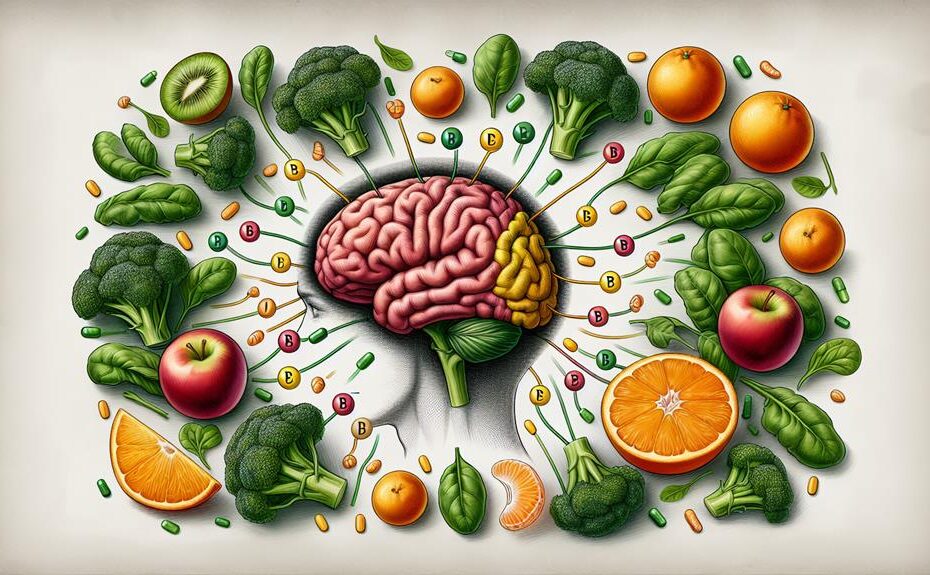






B Vitamins play a significant role in your mental health and mood. They support brain functions and neurotransmitter synthesis, affecting cognitive function, memory, and stress management. Deficiencies can lead to cognitive impairments and mood disorders. B6, B9, and B12 are vital for regulating neurotransmitters like serotonin, dopamine, and norepinephrine. Adequate intake through diet or supplements supports emotional well-being. If you're curious about how B vitamins impact anxiety, stress, and brain function, their benefits go beyond just mental health and mood enhancement.
Key Takeaways
- B vitamins support brain functions and neurotransmitter production crucial for mental health.
- Deficiencies in B vitamins can lead to cognitive impairments, memory problems, and mood disorders.
- B vitamins like B6, B9, and B12 are essential for synthesizing mood-regulating neurotransmitters.
- Adequate B vitamin intake through diet or supplementation improves cognitive function and emotional well-being.
- B vitamins help manage stress, regulate mood, and support optimal brain function for mental wellness.
Importance of B Vitamins for Mental Health
B Vitamins play an essential role in supporting mental health by contributing to various brain functions and neurotransmitter production. Vitamin B deficiency can negatively impact cognitive function, leading to issues with memory, focus, and overall mental clarity. These essential vitamins, including B6, B12, and folate, are critical for the synthesis of neurotransmitters like serotonin, dopamine, and norepinephrine, which play a significant role in regulating mood and cognitive processes.
When there is a deficiency in B vitamins, the brain may struggle to produce adequate levels of these neurotransmitters, resulting in cognitive impairments such as decreased concentration, memory problems, and even mood disorders. Studies have shown that supplementing with B vitamins can improve cognitive function, especially in individuals with deficiencies or those at risk of deficiencies due to poor diet or certain health conditions.
Therefore, ensuring sufficient intake of B vitamins through a balanced diet or supplementation is essential for maintaining an ideal cognitive function and supporting overall mental health.
Effects of B Vitamins on Mood
Boosting your intake of B vitamins can have a significant impact on regulating mood and supporting overall mental well-being. Research suggests that B vitamins play a vital role in mood regulation and emotional well-being through various mechanisms. Vitamin therapy involving B vitamins, such as B6, B9 (folate), and B12, has been linked to improved mood and mental health outcomes. These vitamins are essential for neurotransmitter synthesis, including serotonin, dopamine, and norepinephrine, which are key players in mood regulation.
Studies have shown that individuals with deficiencies in B vitamins may be more prone to mood disorders like depression and anxiety. By ensuring an adequate intake of B vitamins through supplementation or diet, you can provide your body with the necessary nutrient support for optimal emotional well-being. Additionally, B vitamins are involved in the methylation process, which is crucial for regulating gene expression and neurotransmitter function, further emphasizing their importance in maintaining a healthy mood. Consider incorporating B vitamin-rich foods or supplements into your daily routine to support your mental health and mood.
Role of B Vitamins in Stress Reduction

The role of B vitamins in stress reduction is vital for maintaining peak mental well-being and resilience against daily pressures. B vitamins, including B6, B9 (folate), and B12, play an essential role in stress management by supporting the production of neurotransmitters like serotonin, dopamine, and norepinephrine, which are vital for regulating mood and cognitive performance. These vitamins are involved in the synthesis of stress hormones like cortisol, helping to modulate the body's response to stress. Research suggests that individuals with B vitamin deficiencies may be more prone to experiencing heightened stress levels and may have difficulties in coping with stressors effectively. By ensuring an adequate intake of B vitamins through diet or supplementation, you can support your body's ability to manage stress and enhance cognitive performance. Incorporating B vitamin-rich foods such as leafy greens, legumes, nuts, and lean meats into your diet can be beneficial for promoting overall well-being and resilience in the face of daily challenges.
B Vitamins and Anxiety Management
Enhancing your mental well-being and resilience can be supported through the strategic incorporation of essential B vitamins in your diet. When it comes to anxiety relief, vitamin therapy plays an important role. B vitamins such as B6, B9 (folate), and B12 are known for their mood enhancement and nutrient support properties. These vitamins are involved in the synthesis of neurotransmitters like serotonin, which plays a significant role in regulating mood and emotions. Research suggests that individuals with low levels of B vitamins may be more prone to anxiety and mood disorders.
Vitamin therapy involving B vitamins has shown promising results in managing anxiety symptoms. Studies indicate that these vitamins can help regulate the body's stress response and promote a sense of calmness. Incorporating foods rich in B vitamins, such as leafy greens, legumes, nuts, and seeds, can be beneficial for anxiety management. Additionally, for individuals with deficiencies or increased needs, B vitamin supplements may be recommended to support overall mental well-being and mood stability.
B Vitamins and Brain Function

Supporting cognitive function and overall brain health, B vitamins play an essential role in maintaining peak mental acuity and performance. B vitamins, including B6, B9 (folate), and B12, are indispensable for cognitive enhancement and memory support. These vitamins are involved in neurotransmitter regulation, which is fundamental for peak brain function and emotional balance.
Vitamin B6, for instance, is necessary for the synthesis of neurotransmitters like serotonin, dopamine, and gamma-aminobutyric acid (GABA), which are pivotal in mood regulation and cognitive processes. Additionally, B9 and B12 are crucial for maintaining healthy nerve cells and supporting the production of red blood cells, which transport oxygen to the brain.
Research indicates that deficiencies in B vitamins can lead to cognitive impairments, memory problems, and mood disorders. By ensuring an adequate intake of B vitamins through diet or supplementation, you can support your brain function, enhance cognitive abilities, and promote emotional well-being. Incorporating B vitamin-rich foods or supplements into your daily routine can contribute to overall brain health and optimize mental performance.



